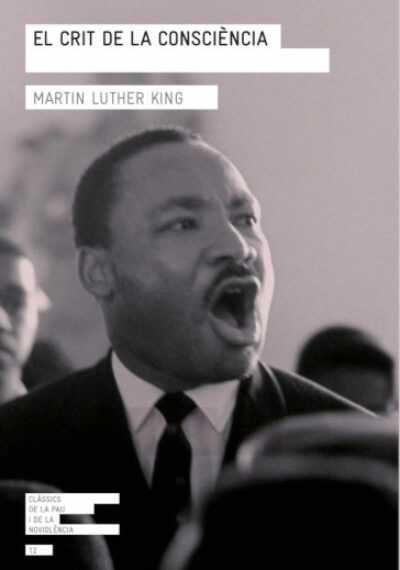
Luther King, Martin; El crit de la consciència. Barcelona: Institut Català Internacional per la Pau; Angle, 2016. Col·lecció Clàssics de la pau i de la noviolència, 12.
El crit de la consciència (The Trumpet of Conscience) features the lectures that Martin Luther King delivered in November and December 1967 – a few months before his assassination – for the Canadian Broadcasting Corporation. The CBC had explicitly asked him to speak about the issues he considered most important, not for blacks, nor for the United States, but for the world at large. The book reveals some of King’s most introspective reflections and his last impressions of the movement he himself had inspired. They are, in a sense, a synthesis of his thought and could be considered to be his testament.
Thus he talks about issues that have been concerning him over the last few months: the need to transform nonviolent protests into mass civil disobedience; the conviction that it was necessary to resist participation in the Vietnam War, and that committed youth should play a decisive role in the creation of a new world, or the need to pursue his dream of universal peace.
“The dispossessed of this nation – the poor, both white and Negro- live in a cruelly unjust society. They must organize a revolution against that injustice, not against the lives of the persons who are their fellow citizens, but against the structures through which the society is refusing to take means which have been called for, and which are at hand, to lift the lead of poverty. “
The author
Martin Luther King was born on January 15, 1929 in Atlanta, Georgia, the son and grandson of pastors of Ebenezer Baptist Church. From an early age he became aware of the situation of social and racial segregation in which black citizens of his country lived, especially in the southern states. After becoming a Baptist pastor, he took over the church in Montgomery, Alabama, in 1954. Starting in 1955, he led the struggle of black Americans to achieve equal rights with whites.
His nonviolent action, inspired by Gandhi, mobilized more and more citizens, culminating in the historic March on Washington in the summer of 1963, with the participation of 250,000 demonstrators. That is when King delivered the most famous and moving of his splendid speeches: I Have a Dream. In 1964 he was awarded the Nobel Peace Prize, four years before he was assassinated in Memphis on April 4, 1968.
